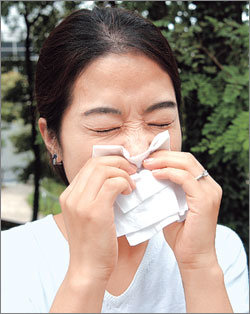Immunotherapy Rescues You from Allergic Rhinitis
Immunotherapy Rescues You from Allergic Rhinitis
Posted September. 12, 2004 22:13,

A graduate student, Mr. Lee, 29, is apprehensive of waking up in the mornings. It is because of his uncontrollable runny nose and sneezing. Assuming that he has a cold caused by the impacts of change of a season, he went to see a doctor. However, what the doctor diagnosed him with was allergic rhinitis.
Plenty of people confuse allergic rhinitis with a cold. When there are no symptoms such as body aching, only symptoms in the nose, you should have an allergic test. The test takes a half hour and costs you 50,000 to 70,000 won.
Allergic rhinitis patients should keep their home surroundings clean and take medicine targeted for decreasing rhinitis symptoms. If the causing substance is clear, immunoetherapy can be one option. This is giving gradually increasing doses of the substance, or allergen, to which the person is allergic. It generally takes one year to get symptoms relieved, and three to five years of regular treatment can make the patient totally allergic-free.
Be careful with pollens
Major causes of allergic rhinitis in the autumn are pollens, house dust and dust mites. In the spring, pollens of birch trees and alder trees are prevalent, but from late August to early October grasses and plants such as wormwood and Ambrosia artemisiaefolia are the cause of high pollens. They are commonly found in greens near riverbanks, parks and gardens in apartment complex. This high prevalence of rhinitis causes makes it hard for people to avoid getting infected.
On rainy days, pollens in the air decrease, and they increase on clear and windy days. Allergic rhitinis patients should avoid going outside on those days. If an outing is inevitable, it is better going outside with glasses and a mouth mask on.
Before coming inside after an outing, you should dust off the dirt outside and wash your face or take a shower as soon as you get in. Keep the windows closed as much as possible except one or two times of ventilation a day. From the time of sunrise to 9 a.m. is the peak time of having symptoms of allergic rhitinis caused by pollens, so patients should look out during this period.
Allergy to dust mites increases
Allergic rhitinis by dust mites is all year around, but the symptoms get serious when the season changes from summer to autumn and continues till next spring.
Dust mites, sticking to blankets and carpets, feed on human skin scurf. They cannot survive in the environment where humidity gets lower than 50 percent. They disperse in high quantity in the monsoon season in the summer, and die out when the season changes into relatively dry autumn. The dead dust mites and their excrement cause allergic rhitinis.
If dust mites cause your allergic rhitinis, you should reduce items made of cloth at home. Bed blankets need to be washed in the hot water over 55 Celsius every two or three weeks. It is better getting rid of fabric carpets. If the inside fabrics of dolls made by needlework are advised not to wash, you should freeze them for 24 hours and dust them off when they melt and dry.
--Chinese herbal medicine works = According to Chinese medicine, it is the imbalance of your organs that causes allergic symptoms. Although two people may have same symptoms, the prescription can be different since each one has different cause.
In general, when people experience cold and weakened lungs, allergic rhitinis often occur. The second popular reason is when kidneys have extra heats. Allergic rhitinis coincides when the heats in the kidneys transport to livers.
Chinese herbal medicine adopts the strategy of strengthening weakened organs for curing allergic rhitinis. To get symptoms relieved, patients should get three to six months of regular treatments.
(Reference: Professors Jo Sang-hun, and Park Joong-won, at the internal medicine department at Seoul National University Hospital and Severance Hospital; Professor An Gang-mo at the pediatrics department at Samsung Medical Center; and Doctor Kim Jae-du, director of Goryoedang Chinese Medicine Hospital.)
TK Sohn sohn@donga.com







